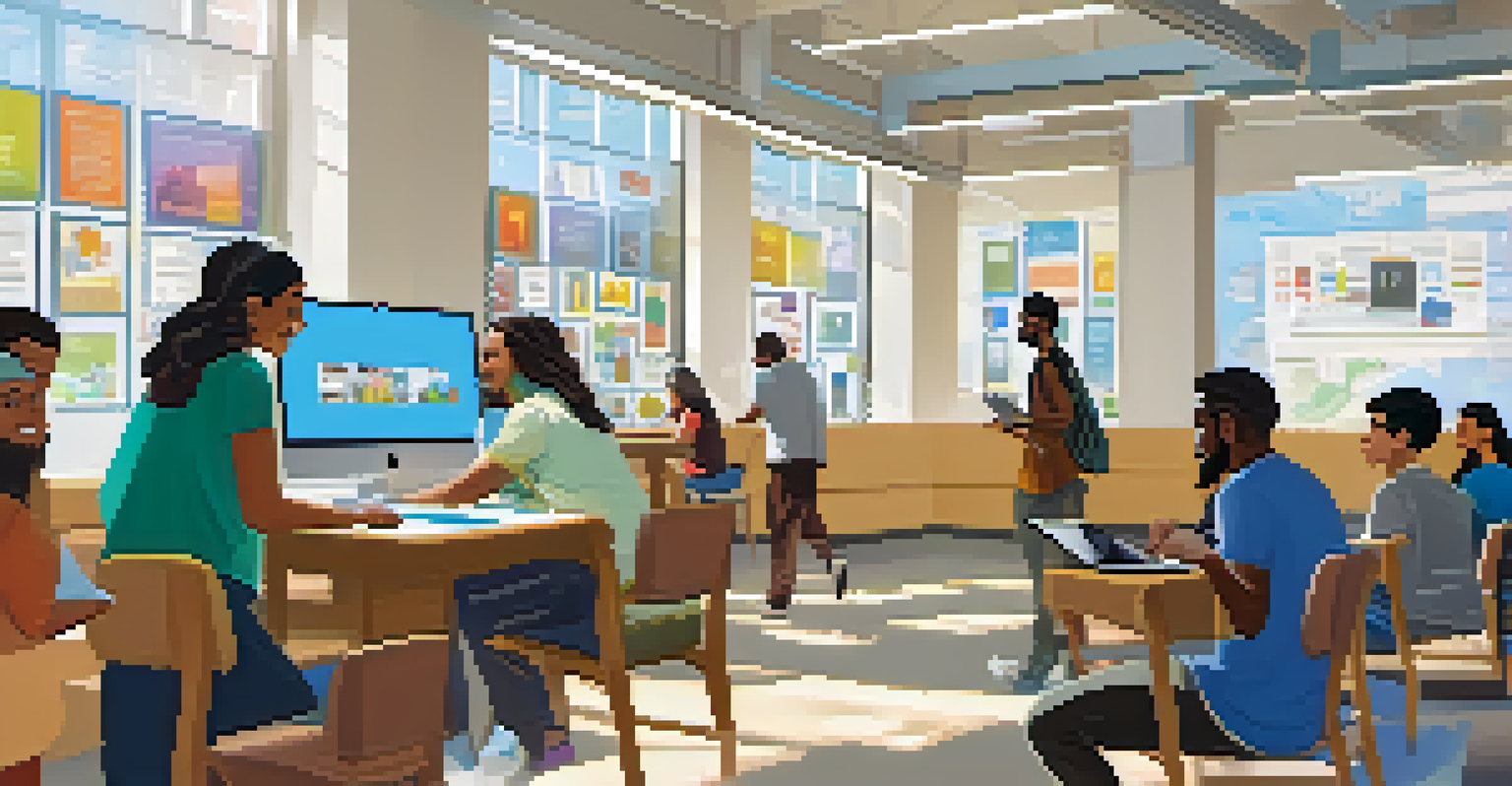Public Libraries and Their Role in Supporting Immigrants

Public Libraries as Safe Spaces for Immigrants
Public libraries serve as welcoming environments where immigrants can feel safe and comfortable. Many newcomers face challenges such as cultural differences and language barriers, making libraries an essential sanctuary. These spaces foster community connections, helping immigrants to integrate and thrive in their new surroundings.
Public libraries are the heart of the community, providing a safe haven for all, especially immigrants seeking connection and support.
In addition to being a physical space, libraries often provide emotional support through community programs and events. They create opportunities for immigrants to meet and engage with others, promoting a sense of belonging. This sense of community is crucial for those navigating the complexities of settling in a new country.
Moreover, libraries are often located in diverse neighborhoods, reflecting the multicultural fabric of society. This diversity can encourage cross-cultural interactions, allowing immigrants to learn from one another while sharing their own experiences. Such exchanges enrich the library environment and benefit all patrons.
Language Learning Resources Available at Libraries
Language acquisition is a critical component of successful integration for immigrants. Public libraries offer a variety of resources, including books, audiobooks, and online courses, to help individuals learn new languages. Many libraries also provide free access to language-learning software and tools, making it easier for newcomers to practice at their own pace.

In addition to traditional resources, libraries often host conversation groups and language exchange programs. These interactive sessions allow immigrants to practice speaking with native speakers, enhancing their confidence and fluency. Such programs not only improve language skills but also foster relationships among participants.
Libraries: Safe Spaces for Immigrants
Public libraries create welcoming environments where immigrants can find community support and resources essential for integration.
Furthermore, libraries frequently partner with local organizations to offer English as a Second Language (ESL) classes. These classes provide structured learning environments, allowing immigrants to gain essential language skills while connecting with others facing similar challenges. The support and encouragement from peers can make a significant difference in their learning journey.
Access to Information and Resources for Immigrants
Public libraries serve as vital hubs of information, providing immigrants with access to resources that are crucial for navigating their new lives. From legal advice to employment opportunities, libraries often curate information tailored to the needs of immigrant communities. This access can empower newcomers to make informed decisions as they settle into their new environment.
Libraries are not just places for books; they are gateways to understanding and celebrating the diversity of our communities.
In addition to printed materials, many libraries offer workshops and seminars on topics relevant to immigrants. These sessions may cover everything from job searching techniques to understanding local laws and customs. By providing this information, libraries help immigrants avoid potential pitfalls and navigate the complexities of their new surroundings.
Furthermore, libraries often collaborate with local agencies and organizations to host informational sessions. These partnerships enhance the resources available to immigrants, ensuring they have access to the support they need. Such community-focused initiatives underscore the library's role as a key resource for immigrants.
Cultural Programs That Celebrate Diversity
Cultural programs at public libraries play a significant role in celebrating diversity and promoting understanding among different communities. Many libraries host events that showcase the rich traditions and customs of immigrant populations, allowing for cultural exchange. These programs can include art exhibits, music performances, and multicultural festivals.
By highlighting the stories and experiences of immigrants, libraries foster awareness and appreciation among the broader community. This not only enriches the library's offerings but also helps to break down stereotypes and build bridges between cultures. Such initiatives create an inclusive environment where everyone feels valued.
Language Learning Opportunities
Libraries offer diverse language resources and programs that help immigrants improve their language skills and build confidence.
Additionally, libraries often encourage immigrants to share their stories through writing workshops or storytelling events. This gives newcomers a platform to express their unique experiences and perspectives, further enhancing community connections. These shared narratives can help to cultivate empathy and understanding among diverse populations.
Technology Access and Digital Literacy Support
In today's digital age, having access to technology is essential for success, particularly for immigrants. Public libraries provide free access to computers, internet, and other digital resources, helping newcomers bridge the technology gap. This access is vital for job searches, online learning, and staying connected with family and friends back home.
Moreover, many libraries offer digital literacy training programs aimed at enhancing tech skills. These workshops can cover everything from basic computer use to navigating online job applications. By equipping immigrants with essential digital skills, libraries empower them to thrive in a technology-driven world.
Additionally, libraries often provide access to online databases and resources that can aid in job searching and career advancement. With the right tools and training, immigrants can take charge of their professional futures, making libraries an indispensable partner in their journey.
Community Connections Through Library Networking
Public libraries often serve as networking hubs, connecting immigrants with local organizations and services. By hosting community events and resource fairs, libraries facilitate interactions between newcomers and service providers. This can lead to valuable connections that support immigrants as they navigate their new lives.
In many cases, libraries partner with local nonprofits and community groups to offer specialized services for immigrants. These collaborations expand the range of resources available, ensuring that newcomers receive comprehensive support. By fostering these connections, libraries play a crucial role in building a strong network of assistance.
Advocacy for Immigrant Rights
Public libraries advocate for immigrant rights and provide access to vital information, empowering newcomers to navigate their new lives.
Furthermore, libraries often maintain bulletin boards and online platforms where community resources can be shared. These tools help immigrants stay informed about job openings, housing options, and other essential services. By acting as a bridge between immigrants and community resources, libraries enhance the overall support system.
Advocacy and Support for Immigrant Rights
Public libraries often take on advocacy roles, supporting the rights of immigrants and promoting social justice. Many libraries actively participate in campaigns that aim to protect the rights of marginalized communities. This commitment aligns with their mission to provide equitable access to information and services for all.
By hosting discussions and events focused on immigrant rights, libraries raise awareness about the challenges faced by these communities. This educational approach helps to foster understanding and empathy among patrons, encouraging them to take action in support of social justice. Libraries can be powerful platforms for advocacy and change.

Moreover, libraries frequently collaborate with legal aid organizations to offer workshops and resources related to immigrant rights. These initiatives empower immigrants with the knowledge they need to advocate for themselves and their communities. By providing this crucial support, libraries reinforce their role as champions of equity and inclusion.